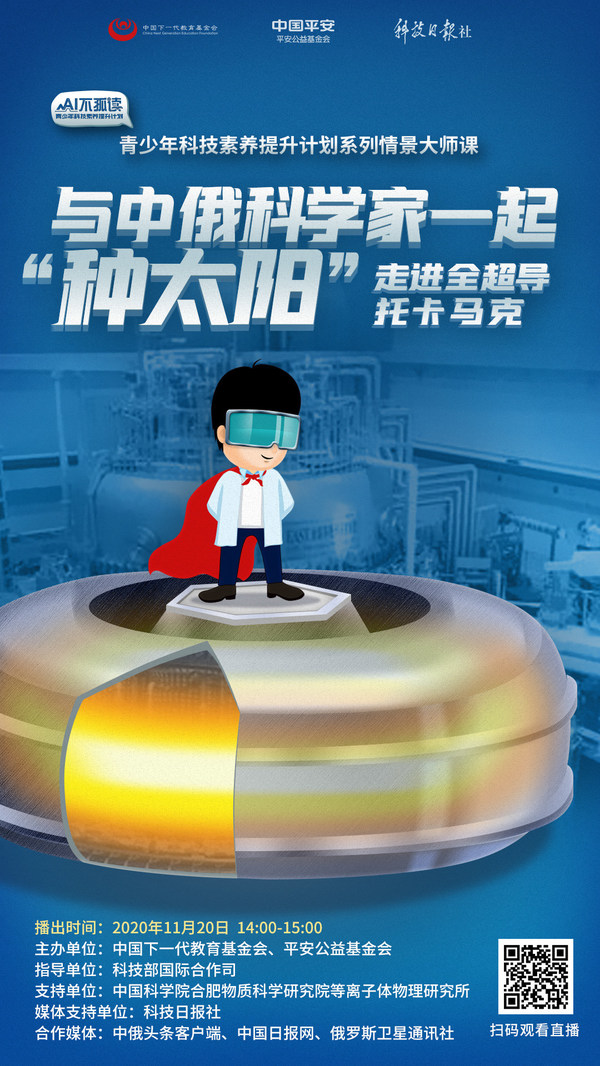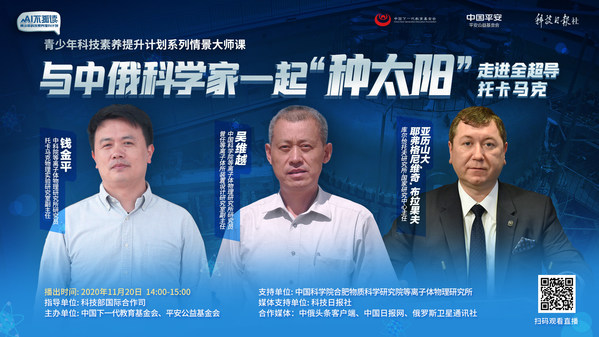BEIJING, Nov. 20, 2020 /PRNewswire/ -- An announcement from Science and Technology Daily | IUSTC:

LIVE TELECAST FOR World Children’s Day: Unveil the future artificial sun with scientists from China and Russia on November 20!
The phrase "energy crises" is no stranger to people. But, how serious are these crises?
Eighty five percent of the energy people use, including coals, fossil oil and natural gas, comes from fossils. An estimate reveals that humans will face the exhaustion of coals within roughly 200 years. Also, no more natural gas will be available to humans in 57 to 65 years. The impending crisis is that all fossil oil will be used up by sometime around 2050.
To make things worse, fossil fuels have led to heavy pollution. The haze is a glaring example.
But, even clean energies, including wind energy, solar energy and tidal energy, do not spare humanity worries. Because they are costly and not power-generative enough.
If humans were to find a safe, clean, efficient and inexhaustible energy, would energy crises disappear?
They would! Because there is nuclear fusion.
Infinite curiosity, intensive research and scientists' in-depth observations of the sun, a huge nuclear fusion device in the universe, have revealed to scientists that the energy of the sun comes from the continuous nuclear fusion reactions inside it. This brings them to a bold hypothesis: By polymerizing hydrogen isotopes into helium, inexhaustible fusion energy will be released. The simulation of the sun's energy production process will gradually make an artificial sun a creation, rather than an imagination written in children's rhymes.
So, what is nuclear fusion? How do scientists simulate the process in which the sun generates energy? What difficulties await scientists before an artificial sun is created? When can we use energy generated from nuclear fusion reactions?
As the Sino-Russian year of technological innovations approaches, a surprise will be given to children in China and Russia on November 20, 2020, the World Children's Day, as part of the situation-based program on the development of teenagers' scientific literacy by experts. Scientists from both countries will be invited to elaborate on the artificial sun and on the hard realization of controllable nuclear fusion.

LIVE TELECAST FOR World Children’s Day: Unveil the future artificial sun with scientists from China and Russia on November 20!
The innovations behind the donut-shaped device by scientists from both countries
Tokomak, a donut-shaped vessel realizing controllable nuclear fusion with magnetic confinement, is the most widely-used artificial sun to date. China and Russia have long worked and progressed together in nuclear fusion. As a fruit of the wisdom of the scientists from both countries, Tokomak has witnessed the friendship between the two countries. Wu Weiyue, a researcher at the Institute of Plasma Physics, Chinese Academy of Sciences, will give a detailed introduction on T-7, the first superconductive Tokamak device given to us by Kurchatov Institute after the disintegration of the Soviet Union, and tell the touching stories of cooperation behind it.
Tokamak devices were first invented by Moscow-based Kurchatov Institute in the 1950s. We have the privilege to invite Alexandre Yevgenivich Bragov, director of the National Research Center of Kurchatov Institute, to this session to tell us about the cooperation between our countries on innovations.
Tokamak devices is one of the state-of-art international open platforms among magnetic confinement-based fusion devices around the globe, and always a paradigm in international technological cooperation. The scientists from both countries will also elaborate on the latest advancements in nuclear fusion. The year 2020-2021 is the Sino-Russian year of technological innovations, and the first national theme year after the new era of the bilateral relations is ushered in. It is also a significant strategic move in technological cooperation for both countries. We believe that the light of fusion will be lit early with the efforts of the scientists in both countries.
EAST, an upgraded Tokamak: One more step to the creation of the artificial sun
EAST, The superconductive ring from the east, is the first fully superconductive magnetically-confined fusion device built autonomously by Chinese scientists alone. Qian Jinping, deputy director of Tokamak Physics Laboratory at the Institute of Plasma Physics, Chinese Academy of Sciences, will unveil the strengths in this upgraded, more powerful version of Tokamak . The host will also take you to the technicians involved in the EAST project, showing you how they work the magic.
Little question-raisers unveiling the huge device
Good questions are starting points to explorations and keys to the doors of knowledge.
Q&A sessions are especially arranged for the teenagers in both countries during this lecture. "Will this artificial sun explode?" "How does this sun store its energy?" " Will this artificial sun heat the earth up?" Questions like these and the interactions between children and the scientists will give a clearer picture of this huge, mysterious scientific device in adults' eyes, to children.
Also, gifts and wishes will be exchanged online between children in the two countries to make the Sino-Russian friendship last long.
Let's unveil this artificial sun together at 14:00 on November 20, 2020!
Scan the QR code below and watch the live telecast

LIVE TELECAST FOR World Children’s Day: Unveil the future artificial sun with scientists from China and Russia on November 20!